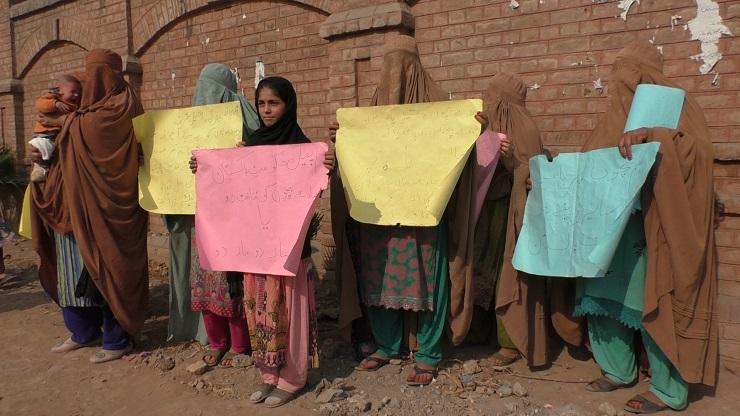ASIACALLING
Families split by Pakistan-Afghanistan border
"Afghans are being forced to leave Pakistan. And the situation is tearing families apart."
Mudassar Shah

The Afghanistan-Pakistan border has long seen a steady flow of movement, with visa-free travel permitted for both nationalities crossing into the other country.
But in recent times, fears of terrorism have tightened border control. Visas and passports are now required for border crossings. Afghans are being forced to leave Pakistan. And the situation is tearing families apart.
Mudassar Shah has this report from Peshawar, Pakistan.
This house in Peshawar has just two small rooms, and an open kitchen. The smell of the bathroom cuts through the air.
It is home to a family of six. 31 year-old Ayesha Rahmat lives here with her four daughters, and 9-year-old son. But her husband of more than 20 years, Rahmat Khan is nowhere to be seen. And Ayesha says his absence has left her in a desperate situation.
“I have stopped taking my medicine as I don’t have money to buy it,” Ayesha confessed. “My children have only eaten one meal a day for the last month. We have not paid utility bills. The owner of the house has asked us to vacate the house next month because we haven’t been able to pay rent for the last few months.”
Ayesha’s husband Rahmat has lived in Pakistan his entire life; he was born in the country after his parents fled Afghanistan during the Russian war of the 1970s. But two months ago, he was forcefully repatriated to Afghanistan.
Even though Rahmat married a Pakistani woman, and their children were born and raised in Pakistan, Ayesha says the family has limited rights.
“Our country’s laws are so cruel towards women,” she cried. “I am a Pakistani citizen, but I can’t get citizenship for my Afghan husband, who is the sole bread winner for my family.”
Their 14-year-old daughter Naznin says she now has to stay home all day, unable to continue her studies. “I was asked to quit my studies in grade 9 because my father is Afghan,” Naznin said.
“I was born in Pakistan, but that doesn’t qualify me for a Pakistan identity card. My mother is a Pakistan national, but even so, I’m not allowed to continue my studies in Pakistani schools. It was my dream to be a doctor. But that dream has been shattered because of clashes between the two countries, and their strict policies,” she told me.
Until 27 February this year, people from both countries could cross the Afghan-Pakistan border without passports or visas. And many took advantage of that freedom, fleeing war in Afghanistan.
There are around 1.3 million registered Afghan refugees living in Pakistan, and a further one million undocumented, according to the United Nations High Commissioner for Refugees. Thousands of Afghans have married Pakistanis, and continue to do so.
Afghan truck driver, Rafi Ullah has recently married a Pakistani woman, and they’re waiting at the border, trying to cross into Afghanistan. But she doesn’t have a passport. So they’ve been stranded for a week.
A 2500 kilometre-long border divides Pakistan and Afghanistan. People on both sides of the border share language, religion and culture, and the countries have long had cordial relations.
But that situation quickly deteriorated after a terrorist attack in Pakistan in December 2014. Afghan militants were blamed for the attack, and Pakistan temporarily closed the border. Since then, there has been more and more terrorist attacks in Pakistan, prompting the government to abolish visa-free travel arrangements.
Meanwhile law enforcement agencies have started ‘search and strike’ operations in areas where Afghan refugees live, tracking down Afghans and forcibly deporting them.
Late last year dozens of Pakistani women who are married to Afghan men came out on the street to demand their husbands be allowed to stay. But despite their opposition, many of the women are left with no way to make a living, and no sign of when their families might be reunited.
And back at Ayesha’s house, her husband is on the phone from Kabul, where he tells her, he plans to take a second wife, after just 2 months apart.
“My husband has decided to marry in Afghanistan,” she tells me. “I have noticed that his voice has changed when he talks to me. He says he needs someone to look after him there, but I can’t ask for the same thing. It’s taboo. I am getting punished for a sin that I didn’t commit.”
- Afghanistan-Pakistan border
- Afghan refugees
Komentar (0)
KBR percaya pembaca situs ini adalah orang-orang yang cerdas dan terpelajar. Karena itu mari kita gunakan kata-kata yang santun di dalam kolom komentar ini. Kalimat yang sopan, menjauhi prasangka SARA (suku, agama, ras dan antargolongan), pasti akan lebih didengar. Yuk, kita praktikkan!